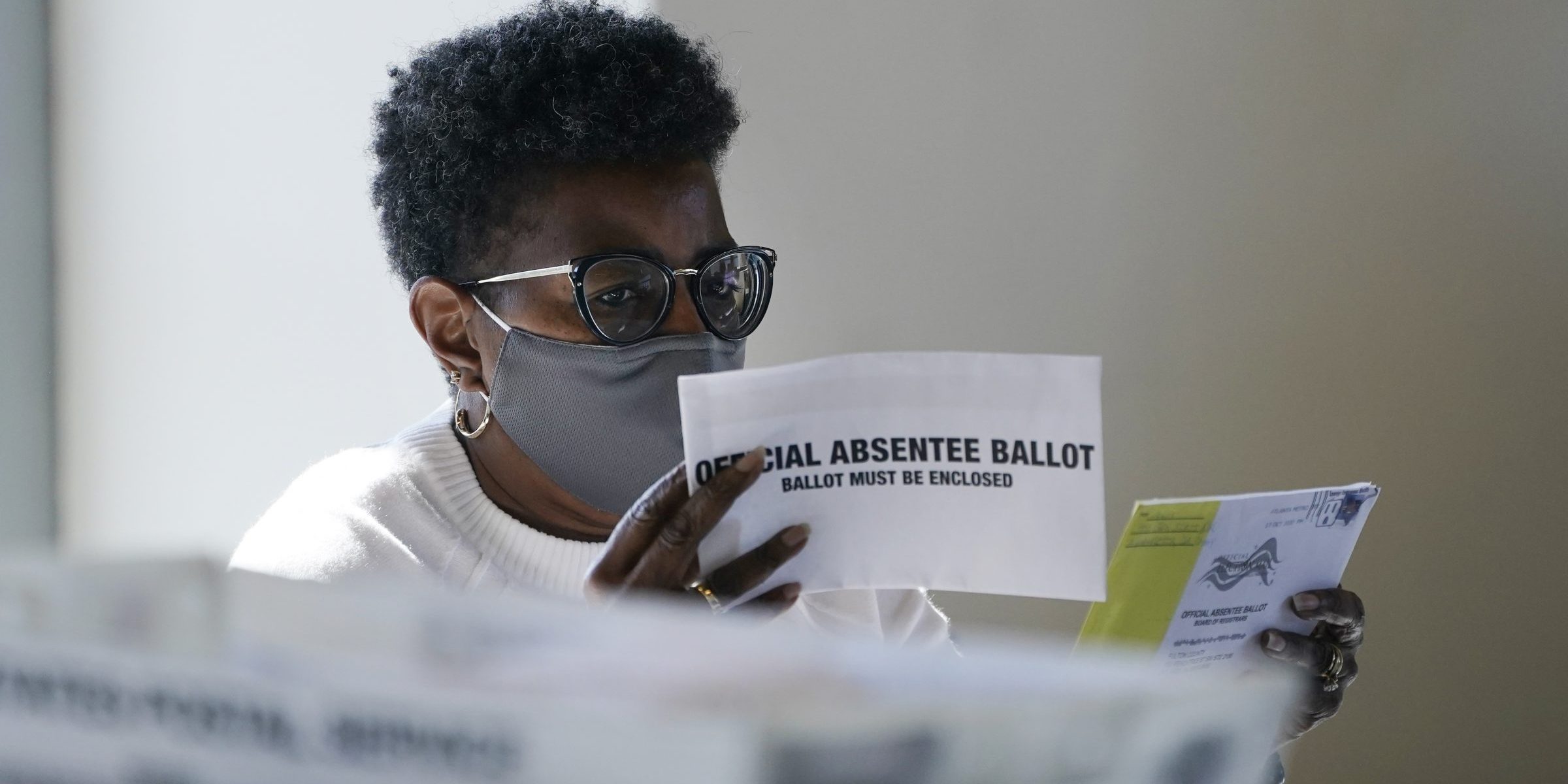Georgia Senate Passes Measure To Eliminate No-Excuse Absentee Voting

The bill would end no-excuse absentee voting, require identification to vote absentee, ban mobile polling locations except in an emergency and provide the state authority to remove underperforming election directors.
John Bazemore / Associated Press file
Updated at 8:38 p.m. Monday
Republicans in the Georgia Senate passed a comprehensive voting bill Monday over the opposition of Democratic senators after more than three hours of debate.
The bill would end no-excuse absentee voting, require identification to vote absentee, ban mobile polling locations except in an emergency and provide the state authority to remove underperforming election directors.
It’s one of more than 70 election-related bills that have been introduced in the Georgia General Assembly after a contentious 2020 election rife with false allegations of widespread voter fraud and faltering Republican confidence in the system.
While it passed on party lines, the package does not have unanimous Republican support.
Lt. Gov. Geoff Duncan, who presides over the Georgia Senate, refused to preside over its debate because he does not support the elimination of no-excuse absentee voting. The speaker of the Georgia House, David Ralston, has also expressed disapproval about the idea.
Another comprehensive election reform package passed the state House last week, which proposes other election-law changes, including a similar identification requirement, but does not require excuses for absentee voting.
None of the measures has passed both chambers yet.
The state Senate is expected to consider a flurry of other election-related bills Monday evening, including proposals to prohibit the state from sending out absentee ballot applications without being requested and replacing automatic voter registration with an opt-in system.
“I agree with every member in this thing that we should do everything we possibly can to get 100% of all legal voters to actually go out and do their civic duty,” said Majority Leader Mike Dugan, who sponsored the bill.
“I also want that 100% to know that their vote counted … that their vote is not rejected because of technicalities or subjective decisions.”
Democratic senators compared the legislation to Jim Crow-era voter suppression tactics and said that this past election cycle has been proven secure.
A report from the Brennan Center for Justice argues ending no-excuse absentee ballots would affect Black voters the most, in part because the proposal protects absentee voting for Georgians over 65, who tend to be white.
Democratic Sen. Nikki Merritt argued against the bill on the basis that many of the Republicans supporting restrictions on absentee voting were elected by those very means.
“Many of you in this chamber won your elections with absentee ballots, ironically making it possible for you to have the ability right now to submit vote-limiting legislation,” Merritt said. “Were your elections fraudulent, too?”
Republican state Sen. Jason Anavitarte said through his support of the measure, he was representing his constituents’ concerns about the election system.
“They have a right to have their voice heard in this Capitol just like the other party,” he said.
“Why should any registered voter need the state’s permission to vote absentee?” protested Democratic Sen. Sonya Halpern. “Many of these provisions are undoing legislation that the Republican majority fought for not so very long ago.”
Republicans have also argued that some election-related proposals have been in the works for years, and originated with Democrats.
Republican Sen. Matt Brass read a speech that Democratic Sen. Elena Parent gave following the 2018 governor’s race also raising the issue of voter confidence.
“So even if you think the [voting] machines can’t be hacked, that all the votes fairly counted — we still need the people of Georgia to believe in the process, and, right now, they are unconvinced,” Brass said, repeating Parent’s words from 2019.
Democratic advocates responded forcefully to the bill’s passage, threatening litigation. “This blatantly unconstitutional legislation will not go unchallenged,” said Lauren Groh-Wargo, CEO of Fair Fight Action.
“It’s time for leaders across Georgia to step up and oppose this dangerous bill before it goes any further. We will continue to fight in Georgia, in the courts, and in Congress to make sure that Georgians’ voting rights are not infringed.”
“Make no mistake, this fight isn’t over,” said Scott Hogan, executive director of the Georgia Democratic Party. “Democrats will fight tooth and nail to stop this bill and every one of the GOP’s attacks on our sacred right to vote.”
The Senate also passed a series of smaller voting-related bills, with some Democratic support. One would require county registrars to update the voting rolls and remove dead voters monthly, sponsored by Republican Sen. Jeff Mullis.
The Senate also voted in favor of another of Mullis’ bills to give poll watchers more freedom in access to tabulation centers when observing the vote count process, which passed along near party lines.
A bill requiring ballots to be printed on special security paper and that they include the name of the precinct for which they are intended also passed without much Democratic support. As did another bill that could fine third-party organizations that send absentee ballot applications to unregistered voters or those who have already voted.
One Democratic voting bill passed unanimously sponsored by Merritt. It adds further notification requirements to counties that relocate polling places, including notifications at the closed polling places directing voters to the new location.








